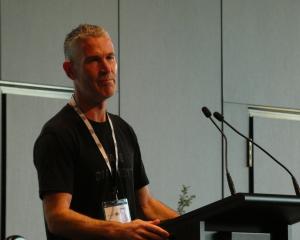
Surviving a decade in the fiercely competitive gaming industry is not easy — Runaway Play managing director Zoe Hobson puts it down to having a happy place to work.
‘‘People here work really hard and really care about their work, but we're also really focused on having work-life balance.
‘‘People here feel really supported and really cared for and I think that makes them want to stay working here, and our staff retention is pretty good.’’
Runaway Play, based in Dunedin’s co-working offices Petridish, is a games studio building and releasing free mobile phone games.
Last month the company celebrated its 10th birthday.
The company has flown under the radar in New Zealand, and Ms Hobson said that was largely down to the fact most of their players were in the US or China.
The company has had a lot of success though; more than 10million downloads, multiple awards and a 70% increase in revenue for the last three years.
The company was started in 2009 by founder Tim Nixon before getting backing from its parent company Natural History New Zealand, which Ms Hobson credits with helping the company survive the early years ‘‘when things were still kind of getting up and running’’.
The office is modern and light; big windows cover one side of the room and a brick wall the other. People are working at stand-up desks, and most usually have television-sized computer monitors and a laptop.
Current Runaway Play games such as Flutter: Butterfly Sanctuary and Furistas Cat Cafe are being worked on, while other staff are developing new games for the coming year.
Titles they have released include Flutter: Starlight and Splash: Ocean Sanctuary.
Their games are based on ‘‘nurturing mechanics’’, Ms Hobson said.
‘‘Our games are relaxing to play and we think of them as being very accessible games.
‘‘People who might not think of themselves as a gamer often play our games, because they find them really relaxing, really easy to play.
‘‘All of our games are inspired by nature as well. So there's a natural element to all of our games, whether that's through the species that you're collecting in the game, or through learning what you can do while you're playing the game about the natural world.’’
Ms Hobson said their games had an ‘‘ethical’’ point of difference from other more addictive games and apps on phones and portable devices.
‘‘We're not trying to get people addicted
... we're not trying to keep people on our games for really long periods of time.
‘‘We strive for ethical games and ethical gameplay that feels fair and fun, not addictive and controlling.
‘‘I'm not too concerned about people, you know, moving away from the phones, and if anything, I'd encourage people to get out into nature.’’
The company boasts a no ‘‘crunch’’ atmosphere. ‘‘Crunch’’ is the industry’s term for periods of extreme, sometimes unpaid overtime for staff, especially as a game nears release.
Ms Hobson said crunch had been avoided through senior staff showing leadership and protecting others.
‘‘The biggest thing for us around having a ‘no crunch’ culture is treating a crunch and overtime as a failure.
‘‘Some companies treat working extra hours [like] a heroic thing, like ‘so and so worked all these extra hours, go them’, whereas we treat it as a failure.
‘‘Having that expectation, that it's a failure on our part as a leadership team when that happens, means that no-one's striving to work these extra hours, we're doing the opposite. We're striving not to work those extra hours and setting up that expectation ... is key.’’
Ms Hobson was proud to have had some staff for the full 10 years, but she said hiring more staff was always a challenge.
That was largely down to the fact the mobile gaming industry was young and there were few experienced people around.
‘‘We are trying to build our own staff of experienced people.
‘‘We do and have historically employed a lot of graduates — a lot of the people in this room joined us as new graduates a few years ago, and we're really working to try to upscale people and give people the opportunity to sort of level up their career within our business.
‘‘But it does mean that we ... do tend to have more junior staff than senior staff.’’
The future is bright for Runaway Play, with two new games planned to be released this year, and Ms Hobson said she was working to keep the business agile, pointing to augmented reality [AR] as a real growth area for the industry.
‘‘Our market changes so much year to year that in terms of strategic planning and business planning, I'm having to completely re-look at our strategic business plan on a much more frequent basis than I would in some other industries.
‘‘It means that we can be shifting and moving and experimenting ... at the moment it's AR.
‘‘Augmented reality is something that all of the big providers are definitely leaning towards and whether or not that becomes mainstream will be really interesting to see.
‘‘I personally think it's still quite a few years off becoming mainstream, but I think there are a lot of benefits that consumers will see from AR in the future ... I think it's got a lot more of a chance of becoming mainstream than some of the other tech like VR [virtual reality] ...’’












